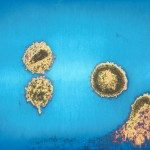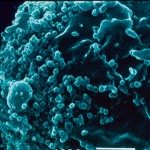Link to Pubmed [PMID] – 25583169
J. Infect. Dis. 2015 Jul;212(1):44-56
Early on in human immunodeficiency virus (HIV) type 1 infection, gut T-helper (Th) 17 cells are massively depleted leading eventually to compromised intestinal barrier function and excessive immune activation. In contrast, the functional Th17 cell compartment of the gut is well-maintained in nonpathogenic simian immunodeficiency virus infection as well as HIV-1 long-term nonprogressors. Here, we show that dendritic cells (DCs) loaded with HIV-1 bearing high surface complement levels after incubation in plasma from HIV-infected individuals secreted significantly higher concentrations of Th17-polarizing cytokines than DCs exposed to nonopsonized HIV-1. The enhanced Th17-polarizing capacity of in vitro-generated and BDCA-1(+) DCs directly isolated from blood was linked to activation of ERK. In addition, C3a produced from DCs exposed to complement-opsonized HIV was associated with the higher Th17 polarization. Our in vitro and ex vivo data, therefore, indicate that complement opsonization of HIV-1 strengthens DC-mediated antiviral immune functions by simultaneously triggering Th17 expansion and intrinsic C3 formation via DC activation.




